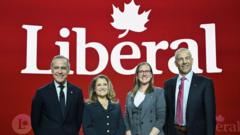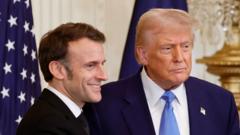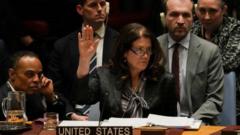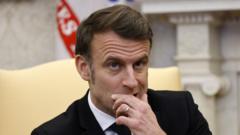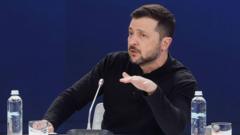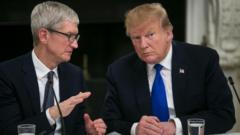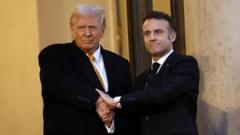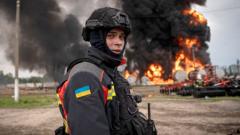The ongoing war in Ukraine presents a significant diplomatic challenge for Europe as American support shifts under Trump’s leadership.
**Navigating Diplomacy: Macron’s Approach to Trump's Administration Amid the Ukraine Crisis**

**Navigating Diplomacy: Macron’s Approach to Trump's Administration Amid the Ukraine Crisis**
European leaders, particularly President Macron, adopt a mix of flattery and gentle pushback in their dealings with an unpredictable Trump.
President Emmanuel Macron of France demonstrated a blend of cordiality and strategic resistance during his recent meeting with President Trump. At a joint news conference, Macron referred to Trump affectionately as “Dear Donald” multiple times, aiming to foster goodwill even while subtly correcting some of Trump's assertions regarding the funds allocated for Ukraine.
Macron's claim of shared history and mutual objectives was central to his narrative, aiming to present a united front in the pursuit of a robust peace agreement for Ukraine. However, his willingness to tactfully push back on Trump’s comments indicated a deeper diplomatic strategy at play. For instance, when Trump suggested that European nations would "get their money back" for their support to Ukraine, Macron pointedly interrupted him, affirming, “We provided real money.”
This diplomatic exchange exemplifies the balancing act European leaders face as the war in Ukraine progresses into its fourth year. American support, pivotal to Ukraine's defense and European stability, has started to waver, creating uncertainty around future alliances.
In another instance, Macron expressed concern over Trump's potential tariffs on European goods, describing them as counterproductive if Europe is to enhance its defense capabilities. “How do you want us to increase security and defense expenditures if we are in a trade war?” he questioned, encapsulating the complex interplay between economic policies and military support.
The muted resistance coupled with compliments highlights the broader diplomatic effort by European leaders to engage the Trump administration amid rising tensions and an evolving geopolitical landscape concerning the war in Ukraine. With the future of transatlantic relations hanging in the balance, Europe is striving to secure not just financial support but a commitment to collective security in a time of crisis.
Macron's claim of shared history and mutual objectives was central to his narrative, aiming to present a united front in the pursuit of a robust peace agreement for Ukraine. However, his willingness to tactfully push back on Trump’s comments indicated a deeper diplomatic strategy at play. For instance, when Trump suggested that European nations would "get their money back" for their support to Ukraine, Macron pointedly interrupted him, affirming, “We provided real money.”
This diplomatic exchange exemplifies the balancing act European leaders face as the war in Ukraine progresses into its fourth year. American support, pivotal to Ukraine's defense and European stability, has started to waver, creating uncertainty around future alliances.
In another instance, Macron expressed concern over Trump's potential tariffs on European goods, describing them as counterproductive if Europe is to enhance its defense capabilities. “How do you want us to increase security and defense expenditures if we are in a trade war?” he questioned, encapsulating the complex interplay between economic policies and military support.
The muted resistance coupled with compliments highlights the broader diplomatic effort by European leaders to engage the Trump administration amid rising tensions and an evolving geopolitical landscape concerning the war in Ukraine. With the future of transatlantic relations hanging in the balance, Europe is striving to secure not just financial support but a commitment to collective security in a time of crisis.



